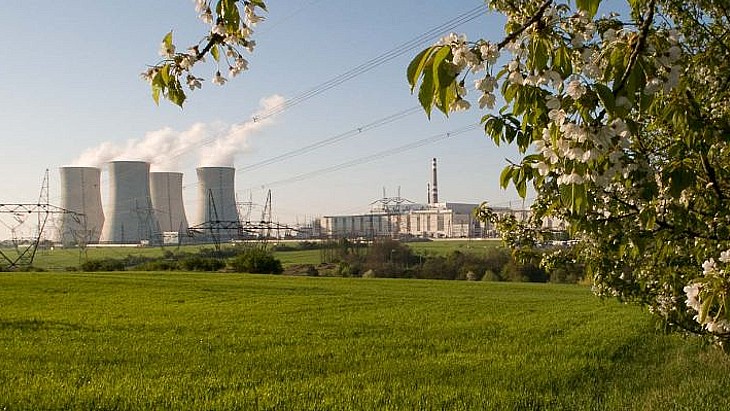The regional court granted the injunction - which lasts until EDF's case is heard in full - because of the "serious harm that the plaintiff (EDF) is threatened with ... if the contract were concluded the French bidder would irretrievably lose the opportunity to obtain the public contract, even if the court ruled in its favour in the lawsuit". An appeal against the decision can be taken to the Supreme Administrative Court, the regional court said.
EDF filed the case to the regional court in Brno after the Office for the Protection of Competition (UOHS) in the Czech Republic on 24 April rejected EDF's challenge to the process used to select the South Korean firm last year for the new nuclear capacity. France's EDF had been on the final two-firm shortlist with Korea Hydro & Nuclear Power (KHNP).
Following the watchdog's ruling - which was made because the tender process had "proceeded on the basis of the safety exception" - the go-head was given for the signing of the contracts, and a delegation of senior executives and political representatives from South Korea were travelling to the Czech Republic for the occasion.
In a statement on its website, the regional court said of its decision "it is a significant public contract ... the court is aware that the decision will bring negative consequences that threaten to arise in the event of a delay in the construction of the new nuclear units in Dukovany. However these do not outweigh the interest in compliance with the law and in ensuring effective judicial review".
The court said it had taken a preliminary assessment of the "seriousness and merits" of the claim. It said that EDF was unhappy that the Czech competition office had ruled that it was not competent to conduct a review into the way the tender process had been conducted.
"The Regional Court in Brno preliminary assessed the plaintiff's (EDF's) arguments against such an approach as relevant and relatively strong and therefore issued a preliminary injunction. This does not mean that the plaintiff will succeed in the subsequent legal proceedings. The court may change its preliminary opinion on the merits of the action once it has become acquainted with its additions, the reactions of the parties to the proceedings and the administrative file."
Following the court decision, Czech Prime Minister Petr Fiala issued a short statement on social media saying: "We take note of the independent court's decision. We are convinced that the process of evaluating bids was conducted fairly and in accordance with applicable laws. In selecting the supplier, the key factors were the availability of reasonably priced electricity for citizens and businesses, as well as the best guarantees. I believe that the court is aware of all the contexts and risks and will decide quickly."
Ahead of the decision, the Czech nuclear power plant operator CEZ said that its Elektrárna Dukovany II project company had conducted the tender "in all phases in a fully transparent manner and under completely fair conditions". It said that from the start it was clear that the process would be under the so-called security exception and international experts, KPMG and the competition office had all agreed with the procedure being used.
It said: "We are convinced that in this case the commercial interest of a private company certainly does not outweigh the public interest in ensuring sufficient electricity for Czech citizens and energy security for the state."
And it issued its own challenge to EDF, saying: "We insist that the KHNP offer is more advantageous for the Czech Republic in all parameters than the offer submitted by EDF. To leave no doubt about this, we call on EDF to publish its offer immediately."
It added that it would respect court decisions but said it was prepared to take action to "recover damages" if the lawsuit was proved to be "unfounded".
The background
The Czech Republic currently gets about one-third of its electricity from the four VVER-440 units at Dukovany, which began operating between 1985 and 1987, and the two VVER-1000 units in operation at Temelín, which came into operation in 2000 and 2002.
In October 2023, Westinghouse, EDF and KHNP submitted binding bids for a fifth unit at the Dukovany nuclear power plant, and non-binding offers for up to three more units - another one at Dukovany and two at the Temelin nuclear power plant. Westinghouse was proposing its AP1000, EDF was proposing its EPR1200 reactor, KHNP was proposing its APR1000. But in February 2024 the Czech government announced it was changing the tender to be binding offers for four new units, with Westinghouse not included because it "did not meet the necessary conditions".
Prime Minister Petr Fiala explained at the time that the decision to switch to binding offers for all four units was the result of the original tender suggesting that contracting for four units, rather than having separate processes, could have a 25% benefit in terms of costs.
In July, he announced KHNP as the preferred bidder, with contract negotiations to begin with the aim of signing contracts for the initial unit by the end of March 2025 - the target for test operation of the first new unit is 2036 with commercial operation in 2038. He said the winning tender "based on the evaluation of experts, offered better conditions in most of the evaluated criteria, including the price". The KHNP bid was for a cost of around CZK200 billion (USD8.6 billion) per unit, if two units were contracted.
Both EDF and Westinghouse appealed to the Czech Republic's competition authorities about the selection process - Westinghouse later withdrew its appeal. Last week it was announced that the Czech state - which already owns 70% of CEZ - was going to purchase 80% of shares in the Elektrárna Dukovany II project, with CEZ retaining a 20% stake. The 80% stake was valued at CZK3.6 billion (USD163 million).
Article researched and written by WNN's Alex Hunt





_55401.png)
_23009.jpg)

_33392.jpg)






